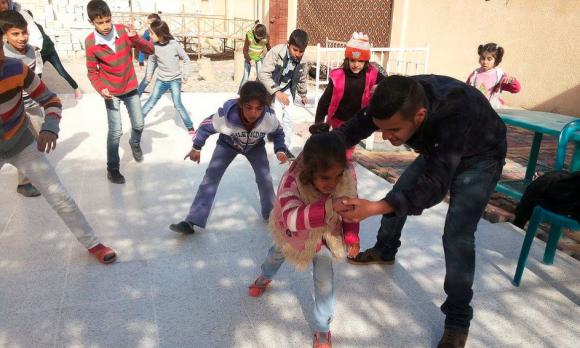Bidna Capoeira
Bidna Capoeira is a London-based organisation teaching capoeira in trouble spots in the Middle East. Figen Gunes asks the founder why.
“Football, body building and aerobics with very bad music were the only social activities in Damascus, Syria, when I started performing Capoeira in the streets before the war erupted,” says Tarek Al-Saleh, German-Syrian founder of Bidna Capoeira. “There was no other street artist around. Local children in Damascus soon engaged in what I was doing and they wanted to learn.”
He left Syria in late 2011 for security reasons but the organisation now has a network of trainers delivering this unique form of martial art on the ground in refugee camps, hospitals and schools in Al Rakka, Syria, and also in Palestinian refugee camps. Having operated from a hot desk in Islington’s Hub since inception, they have hooked up with UNICEF and Save the Children to raise hopes of war zone youngsters. But Bidna Capoeira faces difficulties as there is a lot of negativity towards foreign organisations in Syria.
“It is a unique combination of music, sport, dance and talks,” Al-Saleh explains. “African slaves developed this as a form of art against oppression in Brazil in colonial times to express their guarded anger. They were hiding the fight in their dance. The special thing about this dance is that it’s not fighting. It is developed as a non-contact form of sport so the aim is to escape. It is a great tool to release anger,” he says.
In refugee camps, children can play football or have occasional clown shows if they are lucky but it seems Capoeira has more to help them express their feelings given the daily struggles they go through. After sessions they have a forum to discuss issues. Capoeira works in a circle form: one person leads the song then others sing in a choir. Also, social issues are discussed. For example, if there is a shooting in the camp, it is brought up to let kids express their feelings in those forums.
Born and bred in Germany, Al-Saleh sold his gym in Cologne to reunite with his father in Damascus in 2007. He started running an estate agency there and performing Capoeira in the streets after work just to engage with youngsters.
“It was not my intention to start a charity. With my first Capoeira group we travelled the whole of Syria in ten days with our beds strapped on top of a minibus back in 2007,” he recalls. But when he visited the Al Tanf Refugee Camp in 2010 near the Iraq-Syria Border he delivered a project for 400 families stuck in a desert for four years, and he decided to found Bidna Capoeira as an international charity.
They will be launching a new office in Amman, Jordan, in cooperation with the Brazilian Embassy to help kids learn this sport as well as to deliver social change through it. They work on overcoming gender issues through this dance as they swap places between girls and boys in performances.
“Capoeira has been historically used for marginalized, disenfranchised young people. Currently, we are developing tools to show the effects of this dance form. It is not seen as a social tool by many but we are in the process of collating data to be able to expand our organisation further and get more funding,” says Ummul Choudhury, director of Bidna Capoeira.
“We are trying to link methodology and its effects,” Choudhury goes on. “For quantative measures, we try to take registers. You may think it is easy but it is not. People don’t want to give their names due to the politicized circumstances in Syria. Kids can be very disruptive in the first class. And so many kids have the same name. We also have happiness questionnaire to conduct,” she explains the difficulties.
Having worked at the Economist for two years, she left the corporate world to get away from ‘the safe path’. “I think one of the reasons our world is the way it is is because most people want to stay on that safe road. They use their talents to get £100k in the city. Safe roads have their own failures and heartbreaks. If people lived their full potential, world would be a different place,” she adds.
Click here to find out more about their work at Al Tanf Refugee Camp















Write Your Comment